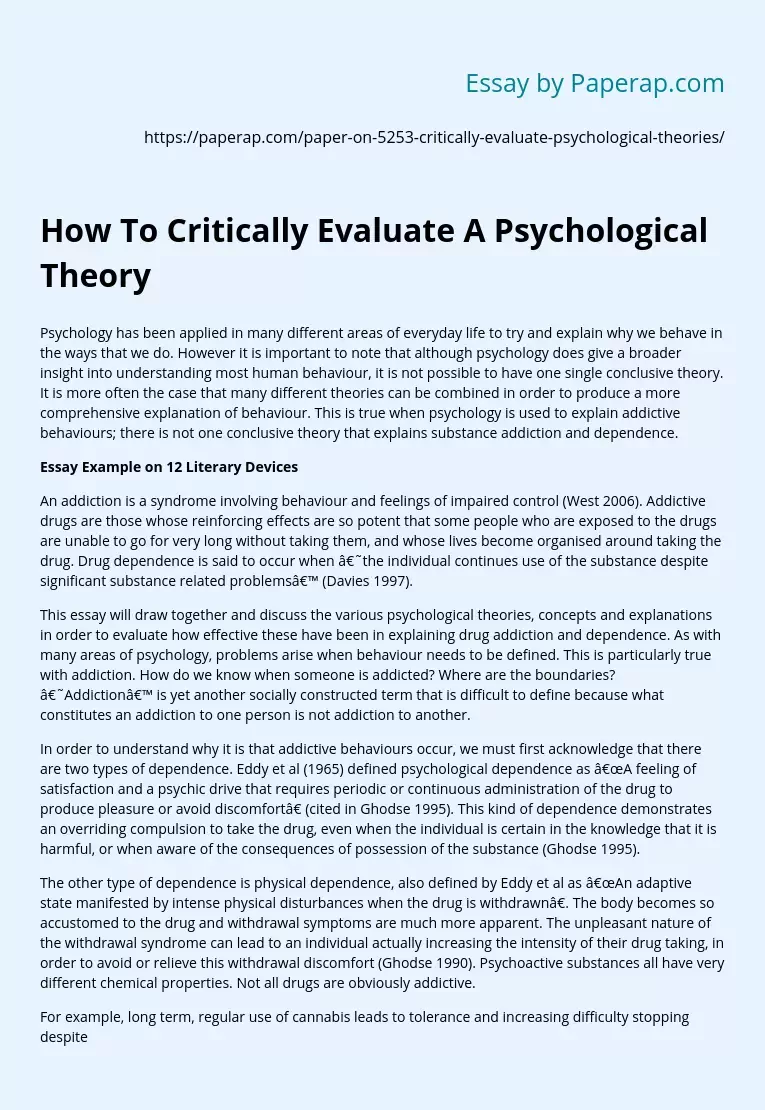How To Critically Evaluate A Psychological Theory
Psychology has been applied in many different areas of everyday life to try and explain why we behave in the ways that we do. However it is important to note that although psychology does give a broader insight into understanding most human behaviour, it is not possible to have one single conclusive theory. It is more often the case that many different theories can be combined in order to produce a more comprehensive explanation of behaviour. This is true when psychology is used to explain addictive behaviours; there is not one conclusive theory that explains substance addiction and dependence.
An addiction is a syndrome involving behaviour and feelings of impaired control (West 2006). Addictive drugs are those whose reinforcing effects are so potent that some people who are exposed to the drugs are unable to go for very long without taking them, and whose lives become organised around taking the drug. Drug dependence is said to occur when ‘the individual continues use of the substance despite significant substance related problems’ (Davies 1997).
This essay will draw together and discuss the various psychological theories, concepts and explanations in order to evaluate how effective these have been in explaining drug addiction and dependence. As with many areas of psychology, problems arise when behaviour needs to be defined. This is particularly true with addiction. How do we know when someone is addicted? Where are the boundaries? ‘Addiction’ is yet another socially constructed term that is difficult to define because what constitutes an addiction to one person is not addiction to another.
In order to understand why it is that addictive behaviours occur, we must first acknowledge that there are two types of dependence. Eddy et al (1965) defined psychological dependence as “A feeling of satisfaction and a psychic drive that requires periodic or continuous administration of the drug to produce pleasure or avoid discomfort” (cited in Ghodse 1995). This kind of dependence demonstrates an overriding compulsion to take the drug, even when the individual is certain in the knowledge that it is harmful, or when aware of the consequences of possession of the substance (Ghodse 1995).
The other type of dependence is physical dependence, also defined by Eddy et al as “An adaptive state manifested by intense physical disturbances when the drug is withdrawn”. The body becomes so accustomed to the drug and withdrawal symptoms are much more apparent. The unpleasant nature of the withdrawal syndrome can lead to an individual actually increasing the intensity of their drug taking, in order to avoid or relieve this withdrawal discomfort (Ghodse 1990). Psychoactive substances all have very different chemical properties. Not all drugs are obviously addictive.
For example, long term, regular use of cannabis leads to tolerance and increasing difficulty stopping despite wishing or attempting to do so. Although the risk of dependence is substantially less than for nicotine or opiates, it is similar to that of alcohol (DiClemente 2003). Heroin addicts often take daily doses that would kill a normal person and experience very unpleasant symptoms if they go ‘cold turkey’ and try to stop. In these terms, tobacco and cocaine were not obviously addictive, yet it was clear that these were extremely difficult habits to break. (Drugs: dilemmas and choices 2000).
This is where the distinction between physical and psychological dependence emerged. It is possible for a person to be psychologically dependent on a drug, without manifesting any physical dependence on it. However, it is generally accepted that although someone may be physically dependant on a drug, the state of dependence cannot be said to exist without some kind of psychological dependence present (Ghodse 1995). Under the Rational Informed Stable Choice (RISC) model, we do things because we expect them to produce benefits, and we know about and are willing to accept the adverse consequences, whether this is smoking, drinking, or drug taking.
For example, a drug user continues to take drugs because it is preferable to the alternative to living without drugs, not necessarily because they cannot stop (West 2006). In other words, the pleasure or escape the addict obtains from a drug is worth whatever the consequences might be. This model is rather simplistic, as its main point is that each individual chooses to keep taking the drug, and does not take into account any biological factors that may or may not be relevant.
How To Critically Evaluate A Psychological Theory. (2019, Nov 27). Retrieved from https://paperap.com/paper-on-5253-critically-evaluate-psychological-theories/

